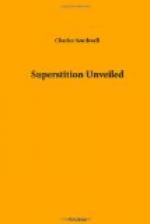As
if religion were intended,
For
nothing else but to be mended.
And never seem so happy as when promising eternal misery to those who reject their chimeras.
But wisdom, we read, is justified by her children; and to the wise of every nation the Universalist confidently appeals. He rejects popular religion, because such religion is based on principles of imaginative ignorance. Bailly defines it as ’the worship of the unknown, piety, godliness, humility, before the unknown.’ Lavater as ’Faith in the supernatural, invisible, unknown’. Vauvenargus as ’the duties of men towards the unknown.’ Dr. Johnson as ’Virtue founded upon reverence of the unknown, and expectation of future rewards and punishments.’ Rivarol as ‘the science of serving the unknown.’ La Bruyere as ’the respectful fear of the unknown.’ Du Marsais, as ’the worship of the unknown, and the practice of all the virtues.’ Walker as ’Virtue founded upon reverence of the unknown, and expectation of rewards or punishments; a system of divine faith and worship as opposed to other systems.’ De Bonald as ’social intercourse between man and the unknown.’ Rees as ’the worship or homage that is due to the unknown as creator, preserver, and, with Christians, as redeemer of the world,’ Lord Brougham as ‘the subject of the science called Theology:’ a science he defines as ‘the knowledge and attributes of the unknown’ which definitions agree in making the essential principle of religion a principle of ignorance. That they are sufficiently correct definitions will not be disputed, and upon them the Universalist is satisfied to rest his case. To him the worship or adoration of what is confessedly unknown is mere superstition; and to him professors of theology are ‘artists in words,’ who pretend to teach what nobody has any conception of. Now, such persons may be well-intentioned; but their wisdom is by no means apparent. They must be wonderfully deficient of the invaluable sense so falsely called ‘common.’ Idolizers of ‘thingless names,’ they set at naught the admirable dictum of Locke that it is ’unphilosophic to suppose names in books signify real entities in nature, unless we can frame clear and distinct ideas of those entities.’
Theists of every class would do well to calmly and fully consider this rule of philosophising, for it involves nothing less than the destruction of belief in the supernatural. The Jupiter of Mythologic History, the Allah of Alkoran, and the Jehovah of ‘Holy Scripture,’ if entities at all, are assuredly entities that baffle human conception. To ‘frame clear and distinct ideas of them’ is impossible. In respect to the attribute of unknown ability all Gods are alike.




